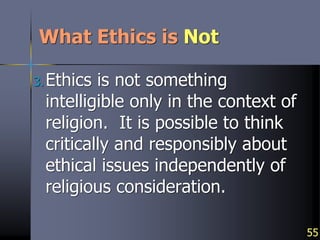This document provides an overview of ethics and morality. It defines ethics as the philosophical study of morality, and morality as the standards that individuals or groups have about what is right and wrong. It discusses the difference between descriptive and normative morality. It also examines the relationship between morality, religion, law, and social etiquette. The document poses questions about the nature and function of morality. It explores different views on the sources and purposes of morality. Finally, it discusses some prominent philosophers like Peter Singer and debates around the idea of moral expertise.
























![25
Why is Ethics Important?
Much of what we are and do is
determined by our moral values,
because our values shape our
thoughts, feelings, actions, and
perceptions [Beliefs Actions].
PETA vs. PETA](https://image.slidesharecdn.com/part-4nature-of-ethics-221021183559-a886c18d/85/Nature-of-Ethics-pptx-25-320.jpg)






















![48
Peter Singer’s Response
First, his general training as
a philosopher should make
him more than ordinarily
competent in argument and
in the detection of invalid
inferences [logical fallacies].](https://image.slidesharecdn.com/part-4nature-of-ethics-221021183559-a886c18d/85/Nature-of-Ethics-pptx-48-320.jpg)
![49
Peter Singer’s Response
Next, his specific experience
in moral philosophy gives
him an understanding of
moral concepts [ethical
theories] and of the logic of
moral argument.](https://image.slidesharecdn.com/part-4nature-of-ethics-221021183559-a886c18d/85/Nature-of-Ethics-pptx-49-320.jpg)




















